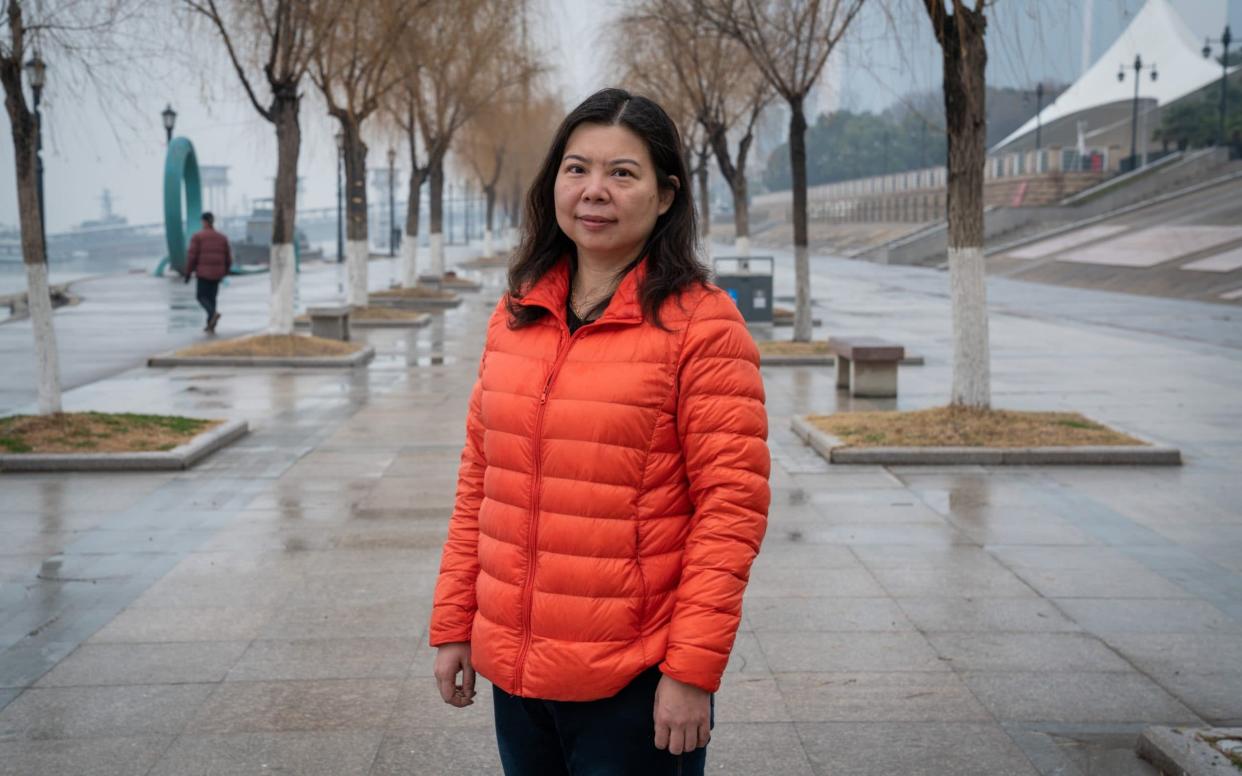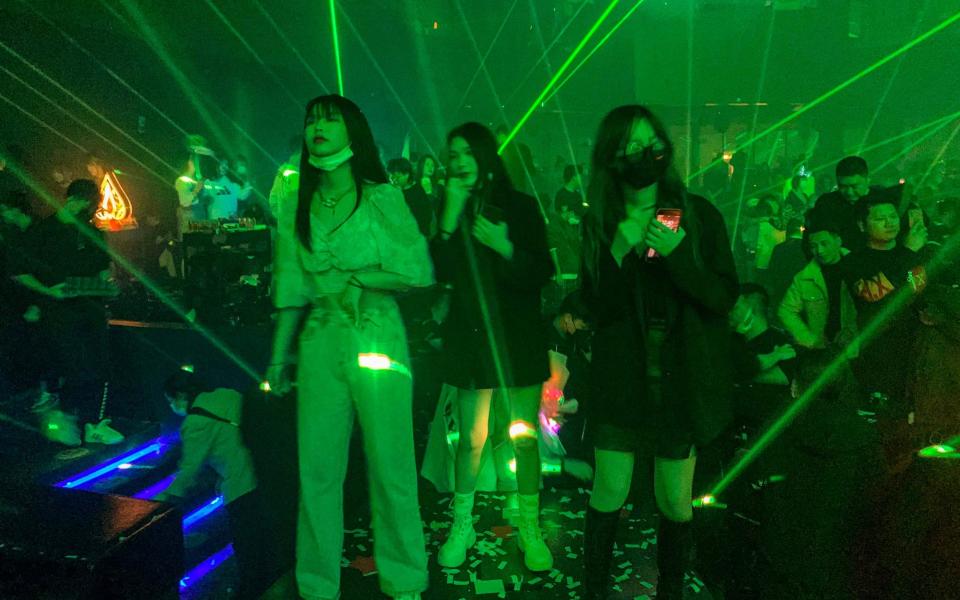Wuhan families harassed as they fight for their day in court over China Covid cover-up

Families who lost relatives during Wuhan's initial outbreak of coronavirus are being blocked in their legal efforts to hold the Chinese authorities responsible for the deaths, one year after lockdown first went in place at ground zero of the pandemic.
Five families accuse the municipal and provincial governments for covering up the outbreak, neglecting to notify the public, and failing to act swiftly, causing infections to explode. More than two million people globally have died from coronavirus.
The Telegraph has interviewed four of the five trying to bring unprecedented lawsuits, most of whom are seeking 2 million yuan (£226,000) each in reparations. They told this newspaper of a campaign of harassment and denial of justice.
Chinese courts have rejected all lawsuits they have tried to file, though they continue to persist by attempting to sue at higher courts, defying government threats that have scared dozens of others into giving up.
Pursuing their cases poses immense risks as they’re challenging China’s official narrative, which claims authorities acted swiftly and with transparency to contain Covid-19, glossing over missteps and the silencing of whistleblowers.

“It’s very clear the authorities concealed the situation at the time and committed a crime that amounts to murder, one that meant my father died,” said Zhang Hai, 51, the first in China to try to sue the government, the Telegraph revealed last June. “This behaviour should be punished by law.”
But “they know if I succeed in filing a lawsuit, that means thousands of other families will also sue,” he said. “Maybe they hope these issues will go away over time.”
Mr Zhang said he never would have checked his father, Zhang Lifa, 76, into a hospital in Wuhan mid-January 2020 had authorities sounded the alarm over the outbreak.
While in hospital for a thigh bone fracture, his father contracted Covid-19, died within a week, and left in a yellow body bag.
At the end of last year, Mr Zhang sent papers to China’s supreme court in Beijing after lower courts in Wuhan city and Hubei province refused to accept his lawsuit, but has yet to receive a response or an acknowledgment the documents arrived.
He even mailed a letter to Party leader Xi, demanding government officials responsible for the cover-up be punished.
Mr Zhang has become an outspoken advocate for families whose relatives died from coronavirus. What he and others want most is an official apology – a public reckoning of the government’s failures.
But that’s unlikely to happen given China’s efforts to snuff out accounts that counter its version of what happened.
As the anniversary of Wuhan going into extreme lockdown passes on Saturday, citizen journalists who sought to scrutinise the early days of the pandemic remain disappeared by the authorities. One of them, Zhang Zhan, resurfaced in court in December and was sentenced to four years in prison for allegedly “picking quarrels,” a charge used to suppress dissidents. Government censors have been scrubbing words like “whistleblower” from the internet.

On Jan 15, Yao Qing, 44, received a terse phone call. The person on the other end refused to give a name, only saying her case wouldn’t be accepted as it didn’t meet the “requirements,” before hanging up. There was no written explanation as required by law.
Ms Yao had a previous grievance against local officials who she said assaulted her for complaining about subway construction causing cracks in her building. When the lockdown was introduced, and all public transport suspended, she was unable to receive treatment for her injury and fell into depression.
She argued that the lockdown was illegal, and forced the public to pay for the government’s mistakes.
“Every person is important,” she said. “It’s not ok the government locked us up at home. They didn’t care whether you could get the medicine you needed; they didn’t care that people, like couriers, suddenly had no way to make a living.”
“I want the Wuhan government to recognise it doesn’t have the right to be above the law.”
Zhao Lei, 39, is seeking reparations to cover her late father’s medical and funeral expenses, the psychological toll on the family, and pension payments due had he lived.

Her father, a retired civil servant in his 60s, died waiting in the emergency room, just five days after the onset of a fever.
“We didn’t know it could be that bad...[because] the government said absolutely nothing,” she said. “Who knows how many people died at home or in hospitals waiting, like my father, because there weren’t enough beds?”
“They didn’t even do an autopsy,” she said. “How exactly did he die so quickly? He was so healthy and had no illnesses.”
One week after she filed her lawsuit, local authorities visited her mother at home and prohibited Ms Zhao from speaking to journalists, saying that “it would look bad for China.” A day after that, the local court refused to take her case.
“What I’m talking about is the truth,” said Ms Zhao. “I’m not spreading rumours or lying; I’m sharing my personal experience. Why should I be forced to stay silent?”
Police and local officials have also harassed Ms Wang, 50, who wants to receive government compensation and a full accounting of what medical staff did – if anything – to save her brother, who died at 43.
He developed a cough in December 2019, but was turned away from four hospitals – even as his symptoms worsened significantly and a CT scan showed an infection in his lungs. When he tried a fifth hospital, he was too weak to wait long enough for a doctor to review his case, and was forced to return home to rest.
On Jan 28 last year, Mr Wang was finally admitted to hospital, along with his wife, who by then had also developed symptoms. But doctors and nurses rarely came by, even when he called for help.
Ten days later, he was sent to the intensive care unit. "Save me," he texted his sister. A few hours later, he died.
“My brother didn’t receive urgent care,” said Ms Wang. “I want to hold the medical staff accountable; during the last phase of his life, he wasn’t treated like a human being.”
“I still listen to his audio messages or read his texts,” she said, crying. “I can’t believe my little brother is gone. He was tall, strong and healthy – in his prime.”
For some Wuhan residents, the harassment goes beyond the grave.
To this day, Mr Zhang has not been allowed to pick up his father’s ashes unless he agrees to be accompanied by local officials. “They just want to monitor me,” he said.
“What are they afraid of? That families will meet each other while collecting ashes and combine efforts to go after the government?”

 Yahoo News
Yahoo News 
